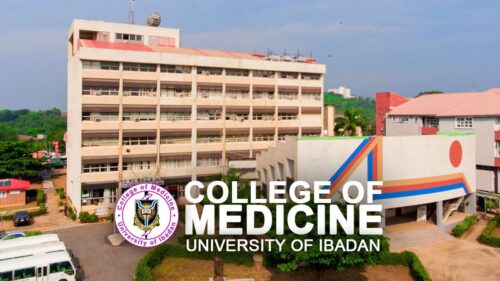By reading this post till the end, you will have a bird’s eye view of the nature of medical schools in Nigeria, how to get admission to study medicine in Nigeria, and the nature of MBBS programs in Nigeria.
Table of Contents
- Why Medicine and Surgery?
- Setting a SMART Goal For Your Admission into a Medical School in Nigeria
- Requirements for Entering Medical Schools in Nigeria
- Other Pathways to get Admitted into a Nigerian Medical School
- Choosing the Best University to Study Medicine in Nigeria
- Best Universities to Study Medicine in Nigeria
- Getting Admission into a Medical School in Nigeria and Setting Your Intention
- MBBS in Nigeria; How the Programs Run
- What Next after Studying Medicine in Nigeria?
- Conclusion
Medicine and surgery is the most sought-after health-related course in all Nigerian universities with over 400, 000 Jamb applicants yearly.
The irony here is that Medicine is also arguably the most difficult university course you can study in Nigeria.
It is the only University course in Nigeria with the longest years required to complete it to earn a degree.
Medical students have to study courses with very high credit units and workloads, coupled with long hours of clinical postings and rotations, just to mention a few.
So why would anyone want to enter a medical school in Nigeria?
I will not just attempt to answer this question, but you will as well find out everything you need to know about studying medicine in Nigeria.
Table of Contents
- Why Medicine and Surgery?
- Setting a SMART Goal For Your Admission into a Medical School in Nigeria
- Requirements for Entering Medical Schools in Nigeria
- Other Pathways to get Admitted into a Nigerian Medical School
- Choosing the Best University to Study Medicine in Nigeria
- Best Universities to Study Medicine in Nigeria
- Getting Admission into a Medical School in Nigeria and Setting Your Intention
- MBBS in Nigeria; How the Programs Run
- What Next after Studying Medicine in Nigeria?
- Conclusion
Why Medicine and Surgery?
A lot of young people who are just about to enter higher institutions make a lot of mistakes in choosing their career path.
These days people look for the wrong things in the wrong professions, and this is because they are not well-guided while making their career choices.
Only a handful of people choose a career path based on the passion they have for it and the satisfaction it would bring them studying and practicing what they love.
On the other hand, the majority of the population choose courses with big names and ‘high class’ because they believe it would make them wealthy upon graduation or for some material benefits.
Now it is wise if we get this straight:
“With the current situation of things in Nigeria, there is no direct relationship between the wealth you can accumulate in the future and the course you choose to study in the University. Wealth accumulation is determined by a lot of other factors like mindset, financial education, and the traditional school system has very insignificant role to play.
So you can understand that if it is just wealth you want to accumulate, Studying Medicine in Nigeria will not be a good decision for you.
You can find a four-year course to save time, learn a skill and start a lucrative business, or even join politics, then you will be surprised at how much wealth you can accumulate.
Does this mean that Medical Graduates in Nigeria do not get rich?
No! Medical doctors are among the highest-paid professionals in Nigeria.
But it takes a long time to get to that peak of your profession when you will start receiving handsome salaries.
So instead of basing your decision of studying medicine in Nigeria on just being wealthy, avoid the frustration of being disappointed after graduation by finding other motivations to enter any of the medical schools in Nigeria like:
- The joy of saving human lives
- The respect that comes from being a Medical professional in the Nigerian society
- The love and passion for medicine
- The joy of taking part in the creation process
- Innovation and Invention
- To be a solution to a disease that a loved one died of, etc.
Setting a SMART Goal For Your Admission into a Medical School in Nigeria

The first step as a Medical school aspirant in Nigeria is to set a Smart Goal as early as possible.
You can even do this as a secondary school student, but just know that it is never too late to set your goals just that the clock keeps ticking.
The SMART goal is geared toward helping you adopt the most efficient time-management technique to help you save much time and stress in your journey into Medical school in Nigeria.
SMART is an acronym for:
- Specific
- Measurable
- Attainable
- Relevant and
- Time-based
I will briefly explain the meaning of these terms in relation to planning your journey for studying medicine in Nigeria.
1. Specific Goal:
Deciding that you want to study medicine in Nigeria is already a very specific goal.
But having many other alternatives in mind like other courses means that your goal is not specific.
The signs of a specific goal include; simplicity, sensibility, and significance.
Making the decision to study medicine should be the most important decision any average student can make.
Average because any top performer can easily choose medicine and surgery as a course of choice and still outshine the best.
So be sure that you want to study medicine and keep every distraction aside like your second-course choices and the rest.
This will help you remain focused while pursuing your medical school career.
2. Measurable Goal:
A measurable goal must be meaningful and motivating.
Find a good reason why you want to undergo the stress that comes from applying for a Medical school in Nigeria.
If not, you will get demotivated easily along the line.
Always remind yourself of this motivation daily, it will keep rekindling that fire you have for the medical career.
Also, more importantly, is that a measurable goal should be responsible for tracking your performance.
A typical example of a Measurable goal in this context is;
“Setting a score you want to get in your Post UTME or JAMB or bringing out the number of hours you must study in a day to help you achieve this goal”.
3. Achievable Goal:
Setting an achievable goal entails aiming for that which is humanly possible for you as a person.
We are all different in our strengths and weaknesses.
Some people can study for 3 hours non-stop while others can barely sit for 30 minutes without a few minutes of stretching.
So in preparing for your WAEC, UTME, and Post-UTME, find out what works most for you and use that as your core strength in mapping out an efficient study plan.
Also, your goal cannot be to score 100% in the Jamb, though it is humanly possible, but remember to be more realistic in setting your goals.
Source for all the relevant study materials you need in your preparation and be determined to study them all before writing any of the exams.
This is an example of an achievable goal if set at the correct time.
4. Relevant Goal:
A relevant goal is reasonable, realistic, resourced, and result-based.
You cannot set a goal to finish a 2nd year Anatomy textbook when you are yet to get admission to study medicine.
First, go for the most relevant things that lay ahead of you and concentrate your energy and workforces on them.
5. Time-Bound:
A good way to set a self-motivating time-bound goal is to picture yourself as a medical student at least once a day for 10 minutes.
Tell yourself that by this time in a given year, you will be a medical student in the medical school of your choice.
The same goes for the study materials you need to cover before your major exams.
Ensure you have a time-frame within which you must try to cover them before the exams.
Also, Read; Medical School Motivation Quotes and Ideas to Keep You going
Requirements for Entering Medical Schools in Nigeria

Medical school in Nigeria has very rigorous requirements which you must meet before you are considered worthy of admittance into the college of medicine.
There are also many pathways one can follow to enter into any of the medical schools in Nigeria and each of them has its own specific requirements.
They are summarized below:
O’Level Requirements for MBBS in Nigeria
It should be clear to you that Medicine and Surgery are considered a Pure Science course in Nigeria.
So first, you must be a science student majoring in the following five courses:
- English
- Mathematics
- Biology
- Physics and
- Chemistry
Then when you are due to write the post-secondary school examinations like the West African Examination Council (WAEC), National Examination Council (NECO), and General Certificate of Education (GCE), the above 5 courses must reflect in your course form.
You should try as much as possible to get a credit in all five courses, as it is a major criterion for being admitted into the major medical schools in Nigeria.
This means you will have to work as hard as you can in your O’level examinations.
Also, it is advisable that you take all the O’level examinations you can.
Never cast all your eggs in a single basket no matter how confident you are.
Try and write the WAEC and the NECO, and if possible the GCE even if you think you will perform so well in any of the exams.
A lot of people have made the mistake of writing only the WAEC, only to fail one or more of the major required courses.
But writing the NECO and GCE is a cool backup plan in case you become unfortunate.
JAMB/UTME Requirements for Entering a Medical School in Nigeria
This is where the admission game starts.
Joint Admission and Matriculation Board (JAMB), which is often used interchangeably as Unified Tertiary Matriculation Examination (UTME) is one of the most demanding requirements for studying medicine in Nigeria.
Being a competitive course, only the best brains from various secondary schools and high schools in Nigeria apply to study medicine and surgery.
So at the UTME phase, you are faced with trying to outperform other bright students from various schools.
This can be very frustrating, but it is highly satisfying if you finally make it through the admission process.
Which Subjects Should I fill I JAMB/UTME for Medicine and Surgery?
The following are the four courses you must write as a Medicine and Surgery aspirant in Nigeria:
- English
- Biology
- Physics and
- Chemistry
One Tip you should follow while filling your Jamb form for Medicine and Surgery:
Always put Medicine as the first choice in your favorite Medical school in Nigeria. Don’t ever make it a second choice. Keep reading and find out how to choose the best university for studying medicine in Nigeria.
Which Scores do I need to get in UTME/JAMB to Get Admitted into Medical School in Nigeria?
Now don’t get it twisted. There is no particular score for JAMB and Post UTME you should count on to get you admitted into a Medical school in Nigeria.
Every year, there is always a slight shift in trends and requirements for admission to various Nigerian universities.
Also, these trends do change depending on the medical school you apply for.
For instance, in the past, the University of Nigeria Nsukka (UNN) used just the JAMB score and the Post-Unified Tertiary Matriculation Examination (Post UTME) in screening for aspirants.
But in the year 2016, there was no Post-UTME conducted for the aspirants.
Instead, their WAEC results were used as a criterion for admission.
But the following year, the normal mode for admission was incorporated again, and it has been the same since then.
That is; the average score of every applicant for JAMB and Post UTME is obtained and a list of the top-performing candidates is computed.
Then a cut-off mark is obtained depending on the number of quotas for Medicine and Surgery in the university and only the candidates who reach this cut-off mark are chosen.
Factors Which Influence the Cut-off Mark
1. The Overall Performance of Candidates who applied to Medical schools in Nigeria:
The cut-off mark for getting admission to study medicine in Nigeria fluctuates from year to year.
This value is determined by the performance of the applicants who chose Medicine and Surgery as their first choice.
So if for a particular year, the UTME candidates for Medicine and Surgery perform exceptionally well, then except that the cut-off mark will be very high that year too.
2. The Number of Candidates who applied for Medicine and Surgery:
If the number of candidates who applied to study medicine is bigger than the quota for the medical school in that university, then there is a high chance that the cut-off mark will be high as well.
But the reverse is the case if the quota for the medical school is bigger for the Medicine applicants in the university.
But the second option is rarely the case because over 100,000 candidates usually apply to study medicine yearly in most Nigerian universities.
Note: The overall performance of all the applicants and the number of candidates who applied are indices used in calculating the total (universal) cut-off mark for Medicine and Surgery.
3. The Catchment Areas:
You may have wondered why someone was denied admission to study medicine in Nigeria while he/she obviously had a higher JAMB and Post-UTME average than another candidate from the Northern states in Nigeria.
Well, the Catchment areas explain these all. Catchment areas are those parts of the country that are generally set aside by the University authorities a higher predilection for admitting candidates from such states.
In some universities in Nigeria, the indigenes of the town where the university is located are used as a major catchment especially if the people are largely uneducated.
Why Do the Universities do this?
Some states in the country are generally considered to be less privileged than the others in terms of basic amenities and resources required to meet the basic education standard set by the various Universities.
So in a bid to create a level-playing ground for all candidates, they are judged based on their Catchment areas.
The factors affecting the various cut-off marks for the different catchment areas are basically the average performance of all the candidates from the states.
In summary, different states will have different cut-off marks depending on the performance of the candidates from the state.
So the various States’ cut-off mark is usually different from the overall cut-off mark which is strictly for the students who will get admitted to study medicine in merit.
Below is a list of the Federal Universities in Nigeria and their Catchment areas:
| S/N | University | Catchment Areas/States |
| 1. | University of Jos | Plateau, Benue, Kebbi, Kogi, Kwara, Nasarawa, Niger |
| University of Benin | Edo, Akwa-Ibom, Bayelsa, Cross-River, Delta, Rivers | |
| University of Calabar | Cross-Rivers, Bayelsa, Delta, Edo, Rivers, | |
| University of Lagos | Lagos, Ekiti,, Osun, Oyo, Ondo, Ogun | |
| University of Ilorin | Kwara, Benue, Kebbi, Kogi, Nasarawa, Plareau, Sokoto, Zamfara | |
| University of Maiduguri | Borno Adamawa, Borno. Bauchi, Gombe, Taraba, Yobe | |
| University of Uyo | Akwa-Ibom Akwa-Ibom, Bayelsa, Cross-River, Delta, Edo, Rivers | |
| Nnamdi Azikiwe University | Anambra, Abia, Anambra, Enugu, Ebonyi, Imo | |
| Ahmadu Bello University | Kaduna Adamawa , Bauchi, Benue, Borno, Jigawa, Kaduna, Kano, Gombe, Kebbi, Kogi, Kwara, Katsina, Niger, Plateau, Sokoto, Nasarawa, Yobe, Zamfara, Taraba | |
| Abubakar Tafawa Balewa University | Bauchi Adamawa, Bauchi, Benue, Borno, Gombe, Taraba, Yobe | |
| Bayero University Kano | Kano, Jigawa, Kaduna, Kano, Katsina, Kebbi, Sokoto, Zamfara | |
| Federal University of Technology | Ondo, Ekiti, Lagos, Osun, Oyo, Ondo | |
| Federal University of Technology, Akure | Ondo, Ekiti, Lagos, Osun, Oyo, Ondo | |
| Federal University of Technology, Minna | Minna Niger, Benue, Kebbi, Kogi, Kwara, Nasarawa, Niger, Plateau, Sokoto, Zamfara | |
| Federal University of Technology, Owerri | Imo, Abia, Anambra, Ebonyi, Rivers, Enugu | |
| Federal University of Technology, Yola | Yola: Adamawa, Bauchi, Borno, Gombe, Taraba, Yobe | |
| Obafemi Awolowo University Ife | Osun, Ekiti, Lagos, Osun, Oyo, Ondo | |
| Usmanu Danfodiyo University, Sokoto | Sokoto Jigawa, Kwara, Kebbi, Katsina, Kano, Kano, Kaduna, Nasarawa, Niger, Sokoto, Zamfara | |
| University of Nigeria Nsukka | Enugu Abia, Anambra, Bayelsa, Cross-River, Delta, Ebonyi, Edo, Enugu, Imo, Rivers |
What you Should aim for Instead in O’Level, Jamb, and Post-Utme
- First, you need to aim at clearing all your O’level courses with at least a Credit. But to be on the safer side, getting an A1 all through is not a bad target at all.
- Keep in mind that some universities in Nigeria like UNILAG, and the University of Ibadan use O’level results as major criteria for screening applicants. So candidates with brilliant scores in their O’levels have higher chances of being admitted.
- You must understand that getting a D7 for any course in the O’level result you want to use in your application automatically disqualifies you from studying medicine in Nigeria.
- Aim to score above 320 for both your JAMB and Post-UTME.
- Finally, Apply for a University that has your state of origin as a catchment area.
Personal Qualities you should have as a Medical School Aspirant
While preparing yourself for the task that lay ahead in Medical school, you should also try and imbibe the following personal qualities;
1. Resilience:
You must prepare ahead for those times in medical school when everything seems to be going wrong with you.
Life in medical school can be stressful, and only the resilience and willingness to continue will keep you going.
The admission process itself can be frustrating.
There are lots of people who had to re-write JAMB more than twice before they were admitted to study medicine in Nigeria.
All those years of waiting for the admission list that your name appears on can be frustrating.
But you only have to be strong till enough to pull through such difficult moments.
2. Diligence and Discipline
It takes due diligence for one to decide to read academic books.
Days will come when you will get tired of reading, but discipline will help you to keep going.
3. Compassion and Empathy
Dealing with patients requires some level of empathy and the ability to put yourself in their shoes in the course of your dealings with them.
Being compassionate makes you the patient’s favorite, and could make you stand out among lots of other colleagues.
4. Focus
One can be easily distracted by a lot of things in the university.
You need to focus on your central purpose of being in school; which is to be a doctor.
This does not mean that you should not find time for other activities, but remember your central purpose comes first.
5. Altruism
This entails being unselfish and being out to cater to the well-being of other people.
This is a quality you should try and develop as a medical school aspirant.
How Many Years does it take to study Medicine in Nigeria?
On average, it takes at least 6 years to complete your MBBS in Nigeria.
Six years is for the federal universities, but in some state universities that may still be struggling with accreditation, it could up to 8 years or more.
The fact is that one hardly ever completes the MBBS in Nigeria under just 6 years even if you pass all your exams in medical school.
One strike or another may impede your progress and could increase the number of years you spend in the university at the end.
But officially, it is generally accepted that it takes 6 years to study medicine and surgery in Nigeria.
Other Pathways to get Admitted into a Nigerian Medical School
Apart from the JAMB and Post JAMB pathways of getting admission to study medicine in Nigeria, there are a few other pathways one can follow to enter any of the medical schools in Nigeria.
And they are discussed below:
1. JUPEB
JUPEB is an acronym for Joint Universities Preliminary Examinations Board.
It is an alternate pathway for students who were unable to get admitted through UTME in Nigeria.
JUPEB was approved by the Nigerian Federal Government in 2013.
The nature of the program is that successfully accepted students in the program are exposed to a one-year study of approved university courses in the university.
These courses must be related to the candidate’s area of specialization (Science or Art).
And the courses covered are almost similar to the first-year courses offered in the university.
At the end of each program, successful candidates are allowed to enter 2nd year in their department of choice, but only if they meet the required cut-off point for the department.
To find out more about JUPEB and possibly register, visit their website.
2. Change of Course
The change of course is also another way one can enter medical school in Nigeria.
But this option is only available for students who have been already admitted to the university, and are currently studying another science-related course.
A student in another science-related department like Medical Rehabilitation, Medical Radiography, Biochemistry, etc. can switch to Medicine and Surgery and continue from 2nd year irrespective of their level in their former departments.
The students are judged based on their Cumulative Grade Point Average (C.G.P.A), which is usually over 5.
The applicants with higher C.G.P.A are admitted into 200 levels of Medicine from where they can continue their studies.
3. Direct Entry
Direct entry is a pathway for those students who already possess a diploma certificate like NCE, ND, IJMB, etc.
Most of these diploma courses are done in colleges of education, and institutes of technology.
For such candidates to get admitted into medical school, they just have to write the Post-UTME for their University of choice.
And if they are successful, they will directly enter the 2nd year of Medicine and Surgery in their University of choice to complete their degree.
4. Transfer
This pathway is the least taken of the four mentioned.
It is only available for those students who are already studying medicine in another medical school in Nigeria or outside the country but would like to change to the university.
A transfer letter and certificate are required with proof of all the courses you have taken in your previous medical school.
Kindly note that you may still be required to pass through the same medical exams you have taken in your previous school before you can be fully accepted.
This means you could step down to the lower classes for the transfer to be valid.
Choosing the Best University to Study Medicine in Nigeria

Having seen the various pathways one can follow to study medicine in Nigeria, the next step is to choose a suitable university to apply for.
There are some factors that you may consider before choosing a medical school in Nigeria and they are outlined in the next section below.
1. Medical School Accreditation in Nigeria
Medical school accreditation is an official process of recognizing a school as being qualified to graduate medical students as doctors.
The body in charge of University accreditation in Nigeria is the Nigerian Universities Commission (NUC).
The accreditation process aims to ascertain the quality of lecturers, available resources like classrooms, laboratories, etc in a given Medical School in Nigeria.
This is to test if they are fully, partially, or unfit to graduate Medical Students as doctors in the country.
Below is a list of fully accredited and partially accredited Universities where you can study Medicine in Nigeria as of 2021;
Fully Accredited Medical Schools in Nigeria
- Abia State University, Uturu, Abia State
- Ebonyi State University, Abakaliki
- University of Lagos, Idi Araba, Lagos
- Obafemi Awolowo University, Ile Ife, Osun State
- University of Port Harcourt, Rivers State
- Usman Dan Fodiyo University, Sokoto
- University of Ibadan Oyo State
- University of Ilorin Kwara State
- University of Calabar, Cross River State
- Lagos State University, Ikeja
- Ambrose Alli University, Ekpoma, Edo State
- University of Jos, Plateau State
- Bayero University, Kano State
- Olabisi Onabanjo University, Ago Iwoye, Ogun State
- Imo State University, Owerri, Imo State
- Madonna University, Okija
- University of Benin, Benin-City, Edo State
- Igbinedion University, Okada, Benin-City, Edo State
- University of Nigeria, Nsukka and Enugu Campus
- Nnamdi Azikiwe University, Nnewi, Anambra state
- Ahmadu Bello University Zaria, Kaduna State
- University of Maiduguri, Borno State
- Delta State University, Abraka
- Enugu State University of Science and Technology, Enugu State
- University of Uyo, Akwa-Ibom State.
Partially Accredited Medical Schools in Nigeria
- Bingham University, Karu, Nasarawa State
- Niger Delta University, Wilberforce Island, Bayelsa State
- Benue State University, Markudi
Note: As of the year 2021, any University not listed above does not have an accredited medical school in Nigeria.
Also, Read; 10 Best Medical Schools for Older Students
2. Analyzing Various Cut-off Marks for Accredited Medical Schools in Nigeria
Various universities have different cut-off marks, some of which are higher and others lower than others.
Also, some schools have higher standards in their Post-UTME exams compared to others.
Some universities also make use of the O’level results in assessing students.
One mistake a lot of students make is to hold onto a particular university and keep writing their entrance examinations from year to year till they pass it.
Sometimes you may just need to have a plan B and even Plan C.
A good point you must note is that although it seems like some medical schools in Nigeria are better than the others, all of them still produce doctors with the same certificates which are all relevant in the labor market after graduation.
So instead of wasting your time waiting to get admission into one school, you can try a couple of other universities too, and if you pass, you can consider entering the school.
A good way to do this is to list a couple of Universities you would like to attend from the list of accredited schools above, and analyze their cut-off marks within the last 3 years.
This will guide you in making a decision on which school you should apply for.
The schools with lower cut-off points on your list have a greater chance of accepting you into their program.
3. Comparing the School Fees for Various Medical Schools in Nigeria
This is another important factor you must consider while choosing a medical school in Nigeria.
Generally, Federal Universities are relatively cheaper in Nigeria compared to State and Private Universities.
It is important that you do not just check the general school fees in the university, but also, the school fees for Medicine and Surgery in the university.
Usually, Medicine and Surgery students usually pay higher than other students in various other departments.
To compare this with other universities you wish to apply for, then choose the one you can easily afford.
Also, Read: 7 Cheapest Private Universities In Nigeria Offering Medicine and Surgery
4. Location of the Medical School in Nigeria
While choosing the location of the university you wish to attend, look out for the following;
- How far is it from home?
- Are there any political, environmental, economic, or social crises going on there?
- Catchment areas (as mentioned above)
5. Cost of Living in the Region
This is another aspect related to the location of the university you want to apply for. Some states in Nigeria have a higher costs of living compared to others.
While checking this, you should pay close attention to the availability of cheap food mainly.
Any Nigerian state that is well known for producing local food should generally have a lower cost of living.
Best Universities to Study Medicine in Nigeria
The last and the least important factor you should consider while choosing a medical school in Nigeria is if the university is among the top best universities in the country.
Now I mentioned that this is the least factor you should consider.
This is because generally, just like I earlier mentioned, the standard of education in all the medical schools listed above is nearly the same.
Although some universities outrank others in terms of webometrics, infrastructure, age, and fame.
Below is a list of the top 10 Universities to study medicine in Nigeria (Source: World Scholarship Forum):
- University Of Ibadan
- Obafemi Awolowo University
- University Of Ilorin
- Ahmadu Bello University Zaria
- University Of Lagos
- Lagos State University
- University Of Nigeria Nsukka
- Delta State University Abraka
- Niger Delta University
- Ambrose Alli University Ekpoma
Read; What is the best medical school in Nigeria?
Getting Admission into a Medical School in Nigeria and Setting Your Intention
Having followed the strategies outlined above, chances are that you will definitely get admission to study medicine in Nigeria.
So let us assume you have already gotten admission to study medicine.
The next very important step is to set your intention on what you want to achieve upon graduation.
A lot of people do not actually take this step.
Yes, there is this argument that you should always take life one step at a time.
But this does not mean that you should not make plans for the better.
Setting your intention requires that you write down your own personal goal or ambition.
And what you should be able to achieve after medical school in Nigeria.
This should be very different from the school curriculum or the cliche of; “I want to get distinctions or Smash all my exams with flying colors”.
A typical example of what is required here is a mantra which a friend usually chants, and it goes like this;
‘I want to be the better doctor”
This does not necessarily mean that you should be the smartest person in the room.
Just find something enticing you want to be known for upon graduation, write it down in your journal, diary, or somewhere handy and remind yourself of it as often as possible.
Doing this alone is enough to keep you motivated through medical school even in those times of hopelessness and crises.
Also, Read How to stay motivated in Medical School through activities and quotes
MBBS in Nigeria; How the Programs Run

In this part, we are going to discuss the various programs you will meet in any medical school in Nigeria, and what is required from you at each stage.
The University of Nigeria will be used as a point of reference.
Before then, you should know that there are essential things you need to buy and get ready before you enter medical school. Check them in the link above and keep reading.
Note that these programs are virtually the same for all medical schools in Nigeria.
1. First Year Medical School in Nigeria
The first year of medical school in Nigeria is usually the most fun and thrilling.
Most medical students at this stage are filled with the euphoria of getting admission to study the ‘almighty’ medicine and surgery in Nigeria.
This period also comes with lots of expectations from families and friends and they will expect you to keep outshining the rest of your colleagues in exams and tests.
Well, this expectation is usually met in the first year of medical school, because the first-year courses are usually an overview of the high school subjects including; English, Physics, Chemistry, and Biology, but in an advanced form.
This period generally lasts for about 10-11 months, and when you successfully pass all your 1st year courses, then you can enter into the 2nd year of Medicine. Which is the 2nd MBBS class.
2. Second Year MBBS in Nigeria
2nd Year MBBS in Nigeria is the first taste a medical student has of the true nature of Medicine and Surgery. This is considered one of the most difficult years in medical school.
Medical students are launched into new medical subjects including; Anatomy, Physiology, Biochemistry, and Medical Psychology. The 2nd year is also the beginning of the 2nd MBBS journey in Nigeria.
3. Third Year MBBS in Nigeria
3rd year Medicine and Surgery in is usually divided into two parts for most medical schools in Nigeria.
The first part covers the completion of the 2nd MBBS exam (First Professional Exam).
This is usually a direct continuation of the 2nd year programs.
The courses which were not completed within the 2nd year in Anatomy, Physiology, and Biochemistry are completed.
This is also the time when most Nigerian Medical schools hold the dreaded 2nd MBBS exam.
2nd MBBS is also called the rate-limiting exam, as it determines whether a student will continue with a medical school or not.
A medical student is usually withdrawn from medical school, after two failed attempts in the 2nd MBBS exam.
In a typical Nigerian Medical school, the 2nd MBBS program takes approximately 18 months to complete.
There is another post on a strategy that could help you pass your 2nd MBBS exam. You can read it after this one by clicking on the link.
The 2nd Part of the 3rd year of MBBS in Nigeria is the introduction to Pathology and Pharmacology.
This is continued till the first part of your year in Medical school.
Also, within this time, you will for the first time start your clinical rotations in medical school.
This involves going to the wards, seeing patients, watching surgeries, attending clinics, etc.
This is called the Medicine 1 and Surgery 1 postings (M1 S1), and you learn history taking and Clerkship in Medicine.
4. Fourth Year MBBS in Nigeria
This also has two parts. The first part is the time where you write your 2nd professional exam; the 3rd MBBS exam.
You are expected to cover the whole of Pathology and Pharmacology within this period.
And when it is done, you write the 3rd MBBS exam.
Also, in the 4th year of Medicine, the 2nd part covers your 2nd clinical and Surgical rotations (Medicine 2 and Surgery 2), where you learn the Physical examination of patients.
5. Fifth Year MBBS in Nigeria
In your 5th year of medical school in Nigeria, you will be launched into the world of Paediatrics and Obstetrics/Gynecology.
The 5th MBBS in Nigeria also comes with the following;
- 3rd Professional exam (4th MBBS exam)
- Medicine 3 and Surgery 3 (M3 S3) Clinical Rotations
- Short Postings (Radiology, Emergency Medicine, Psychiatry, Otolaryngology, Dermatology, Anesthesiology, Ophthamology, and Family Medicine).
- Community Medicine
6. Sixth Year MBBS in Nigeria
This marks the end of the MBBS programs.
It comes with the last clinical rotations (Medicine 4 and Surgery 4 Posting).
Also, the last clinical posting in community medicine is usually done within this period.
In the end, you take your final professional exam, also called the 5th MBBS exam.
After which you officially become a Medical Doctor.
The Additional Years in Other Medical Schools in Nigeria
For some medical schools, it takes more than 6 years to complete this program. Some 7, others 8 or more.
This could be related to the accreditation issues as stated above, Incessant strikes, and other issues.
Recommended; What are the Medical School Exams Like? 8 Important Steps for Preparation
What Next after Studying Medicine in Nigeria?
So after medical school, you can consider a lot of career pathways that you can follow. They include;
- House Job (Housemanship)/Internship
- Internship
- Residency
- General Practice
- Traveling abroad
- Business
- Politics, etc.
There is absolutely no limit to what a medical graduate from Nigeria can become.
So just find a suitable pathway according to your passion.
Also, Read; Career Opportunities after medical school in Nigeria
Conclusion
From all indications, you can see that MBBS in Nigeria is not a child’s play at all.
You will encounter lots of trials as a medical student.
But in the end, it is not just the strong that survive, but those who have decided to keep moving against all odds.
Medical school in Nigeria has frustrated a lot of people.
In the course of your journey through it, try a strike a balance in your life.
Find something that gives you joy and be doing it from time to time, it could relieve a lot of stress.
Also remember to take good care of your body, mind, and soul.
A good balance of the three will make you the better doctor you have always wished to be.
Finally, If you see a fresh medical graduate, get him/her a gift; it’s not an easy journey. You can choose from the available gift ideas for doctors.
Kindly share this post if you feel motivated and encouraged by it!
You May Also Like





I have a friend who has written jamb since 2016 till this year to get admission into medicine yet he couldn’t get it. He already has a degree in another Science course. But he has not given up on his dream to become a medical Doctor.
Honestly even this is a motivation
Nice
Nice write up
Thanks for reading through Jude
The fact that doctors are still not well taken care of in some places after all these stress is what annoys me the most.
Its sad Dimma…so sad
Medicine is not a profession that will get you rich quickly especially in Nigeria.
It requires lots of years of dedication and patience.
I think finding another motivation to study medicine in Nigeria other than wealth accumulation could help, like the ones mentioned in the post, also finding side hustles too.
Tried getting admission to study medicine in Nigeria for 2 straight years…today am happy to be a Med Lab Scientist.
Medicine is not a course for the faint hearted. It will attempt to strain you beyond your capacity. But if you don’t give-in, i think its worth it at the end.
Thanks for the inspiring comment